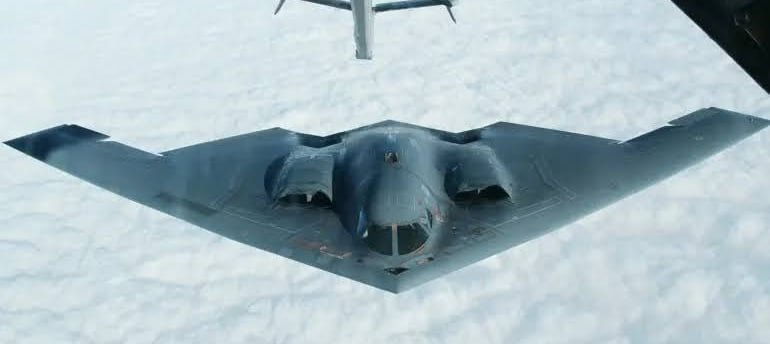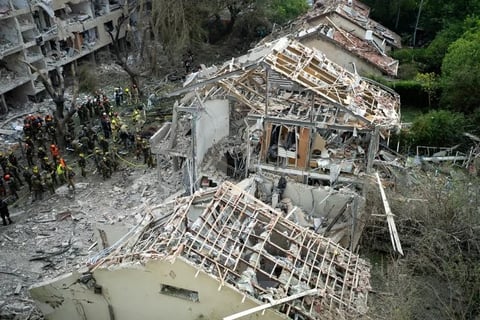U.S. Airstrikes on Iran’s Nuclear Sites Ignite Dangerous Regional Escalation
The U.S. strikes Iranian nuclear sites as Iran launches missiles at Tel Aviv and Haifa, escalating the Israeli-Iranian war. Full coverage of regional threats and military responses.
NEWSGLOBALREPORT
Refaat Ibrahim
6/22/20253 min read


On the tenth day of the Israeli-Iranian war, the conflict has reached a dangerous new level. U.S. President Donald Trump announced early Sunday that American forces had carried out a "highly successful" airstrike targeting three of Iran’s major nuclear facilities: Fordow, Natanz, and Isfahan. In retaliation, Iran launched dozens of missiles toward key Israeli cities in the most intense escalation since hostilities began on June 13.
Trump Declares “The Time for Peace” After Hitting Nuclear Sites
In a post on his platform “Truth Social,” President Trump confirmed the precision airstrikes on Iran’s nuclear infrastructure, stating that “Fordow is finished” and declaring that “now is the time for peace.”
The attack came earlier than expected, following statements in recent days that the U.S. was weighing options and would decide within two weeks. The strike echoed a previous Israeli surprise attack deep inside Iranian territory.
Reports confirm that the U.S. deployed the stealth B-2 Spirit bomber, one of the few aircraft capable of bypassing advanced air defenses and accurately striking fortified underground targets, a clear sign that the operation targeted Iran’s nuclear capabilities at their core.
Iran Responds with “True Promise 3” and Targets Central Israel
Hours after the American strike, Iran’s Islamic Revolutionary Guard Corps (IRGC) launched the 20th wave of its “True Promise 3” operation, targeting critical Israeli sites, including Ben Gurion Airport, a biological research center, and command-and-control facilities.
This retaliatory barrage involved a range of long-range missiles, including the Kheibar missile, deployed for the first time in an operational capacity.
According to Israel Hayom, more than 30 Iranian missiles were launched. Air raid sirens sounded across northern and central Israel, as at least 27 people were injured, including two in critical condition, and multiple residential buildings sustained heavy damage.
Massive Destruction and Israeli Alarm System Failures
Israeli Army Radio reported that several missiles hit densely populated areas, including Ness Ziona near Tel Aviv and the city of Haifa, causing widespread damage.
Authorities confirmed that approximately 20 people remain trapped under the rubble, and fires broke out in multiple buildings and vehicles in central Israel.
Israeli defense officials launched an internal investigation after no alarms were triggered in Haifa, where a missile landed without warning, raising serious questions about the effectiveness of the national alert system.


Iran Denounces the U.S. Strike and Threatens Wider War
Iranian Foreign Minister Abbas Araghchi condemned the U.S. strikes as a gross violation of international law and the UN Charter, emphasizing that Iran reserves the right to defend its sovereignty by all necessary means.
An Iranian senior official told Al Jazeera that U.S. involvement alongside Israel would expand the war regionally, warning that American bases in the region could become legitimate targets. He also suggested that Israel’s Dimona nuclear facility could be struck if the war escalates further.
Israel Hails the U.S. Strike as a "Historic" Turning Point
Israeli Defense Minister Yisrael Katz praised President Trump’s decision, calling it a “historic” action to prevent Iran from obtaining nuclear weapons and to secure Israel’s ongoing military efforts.
Israeli Prime Minister Benjamin Netanyahu described the airstrike as “powerful and historic,” claiming that Trump “did what no other country dared to do.” Netanyahu credited Trump for the “bold” decision to hit Iran’s nuclear sites directly.
Israel Closes Airspace and Prepares for Northern Front Escalation
Amid growing concerns of a broader conflict, Channel 12 reported that Israel has shut down its airspace until further notice.
Simultaneously, the Israeli military raised its alert level on the Lebanese border, anticipating potential attacks from Hezbollah in response to the regional turmoil.
Wider Conflict Looms as Diplomacy Collapses
These developments mark a dangerous turning point in a conflict that has unfolded rapidly since mid-June. With U.S.-Iran nuclear negotiations effectively frozen, the direct confrontation between Tehran and Tel Aviv, now backed militarily by Washington, risks triggering a full-blown regional war.
Israeli Finance Minister Bezalel Smotrich declared that “the world is now safer, for Israel and everyone,” but cautioned that “the war is far from over,” urging citizens to follow home front instructions.
While Israeli leadership celebrates the U.S. intervention, diplomatic analysts warn that this strike could destroy any remaining chance of a negotiated settlement and might permanently derail Iran’s willingness to return to the negotiating table.
Awareness
Documenting reality, amplifying Palestinian voices, raising awareness.
Contact Us:
resistant.p.pens@gmail.com
Follow our social media
